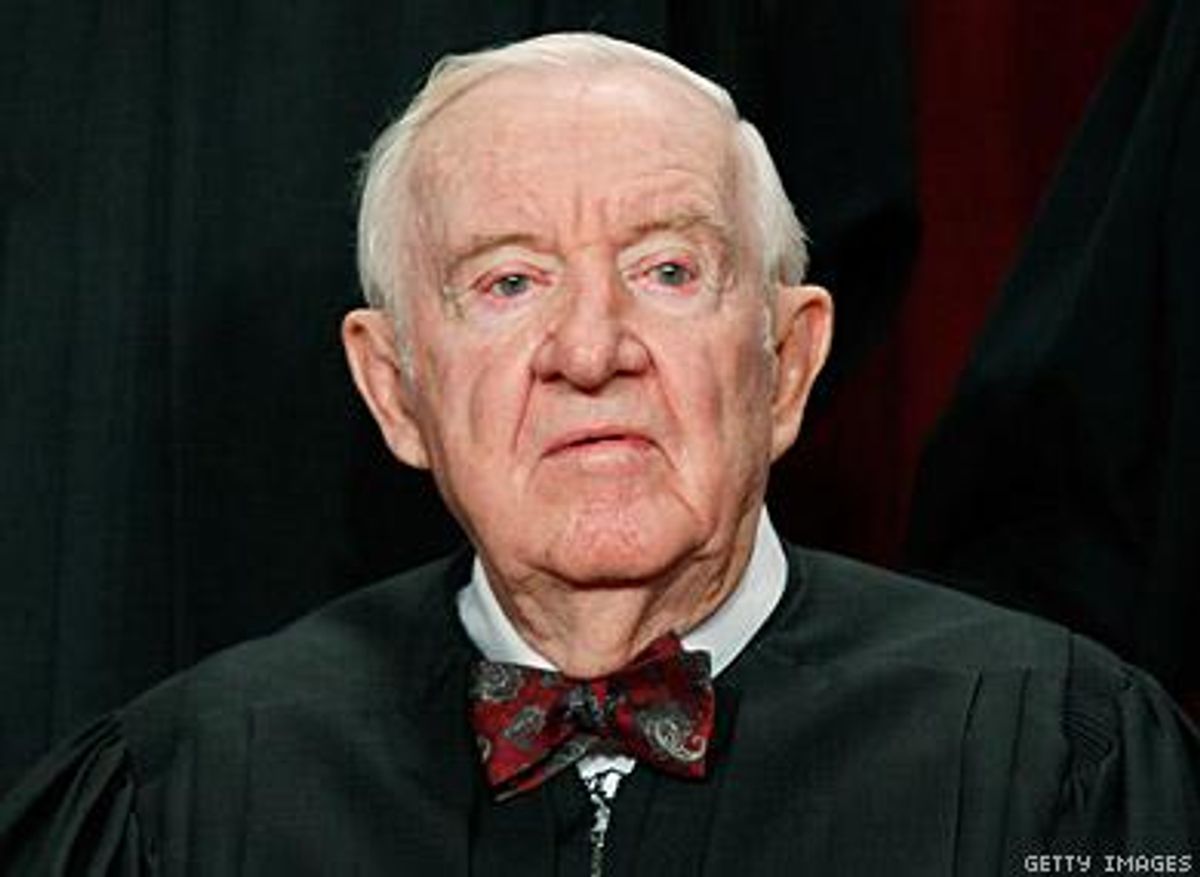World
Supreme Court Justice John Paul Stevens Retiring

By continuing to use our site, you agree to our Private Policy and Terms of Use.

Senior Associate Justice John Paul Stevens, a staunch liberal voice on the Supreme Court for 34 years, announced on Friday that he will retire at the end of the current term, leaving President Barack Obama with his second high court opening to fill.
Although two openly gay law professors were among nominee speculation during Obama's first high court vacancy (ultimately filled by Justice Sonia Sotomayor), the evolving short list of replacements for Stevens does not include any plausible openly LGBT candidates, observers say.
"I think Obama will move quickly, and I would be very surprised if he picked a gay person," Richard Socarides, an attorney and former White House adviser to Bill Clinton told The Advocate. "We need a gay cabinet member or governor or senator first, I think. In the next decade, yes, maybe. Now, no."
Jeffrey Toobin, a contributor for The New Yorker and CNN commentator, speculated that solicitor general Elena Kagan, 49, is a top contender for the vacancy. If confirmed by Congress, Kagan would be the only non-judge to sit on the Supreme Court and the first non-judge to be confirmed since Justices Lewis F. Powell and William Rehnquist, both who were confirmed in 1971. Rehnquist became chief justice in 1986, a position he held for nearly 19 years.
The Associated Press also speculated that leading candidates include federal appellate judges Merrick Garland, 57, and Diane
Wood, 59. The New York Times's Adam Liptak included Michigan governor Jennifer Granholm and Secretary of Homeland Security and former Arizona governor Janet Napolitano in his list of viable nominees.
Though Toobin speculated on CNN on Friday that Obama's nominee would be a left-of-center moderate, rather than a liberal firebrand, several observers doubted that Stevens's replacement would tip the balance of future LGBT cases before the court in the wrong direction. "Chances are the nomination won't affect gay rights constitutional cases much, because the new nominee is likely to be as friendly to such cases as Justice Stevens was," said Eugene Volokh, a professor at UCLA School of Law.
Erwin Chemerinsky, a constitutional law scholar and founding dean of the UC-Irvine School of Law, predicted that Obama will choose a nominee who is either a governor or senator. "I think he will perceive the court as benefiting from that real-world perspective," he said. As for sexual orientation, "I don't know if there are any openly gay or lesbian individuals who would meet this criterion," Chemerinsky continued, though, he said "it would be wonderful if President Obama would put the first openly gay or lesbian justice on the Court."
During rampant speculation surrounding Obama's first high court vacancy last year, both The Washington Post and The Wall Street Journal included openly gay Stanford law professor Kathleen Sullivan in their short list of potential candidates. The New Republic deemed a gay Supreme Court nominee "plausible," and singled out Pam Karlan, another Stanford law professor and founding director of the school's Supreme Court litigation clinic. Neither seem to be on Supreme Court pundits' current radar.
In a one-paragraph letter to Obama released Friday, Stevens wrote that "it would be in the best interests of the Court to have my successor appointed and confirmed well in advance of the commencement of the Court's next term." Speaking in the Rose Garden on Friday afternoon, Obama said he would "move quickly" in his search for a successor, and said he would seek out a nominee with "a record of excellence and integrity, a fierce dedication to the rule of law, and a keen understanding of how the law affects the daily lives of ordinary people."
During his tenure, Stevens was an ardent supporter of gay rights in several landmark cases. In 1986, when the court upheld a Georgia sodomy law in Bowers v. Hardwick, Stevens wrote one of two dissenting opinions. "Although the meaning of the principle that 'all men are created equal' is not always clear, it surely must mean that every free citizen has the same interest in 'liberty' that the members of the majority share," Stevens wrote. "From the standpoint of the individual, the homosexual and the heterosexual have the same interest in deciding how he will live his own life, and, more narrowly, how he will conduct himself in his personal and voluntary associations with his companions."
Stevens joined the majority in overturning Bowers in the landmark 2003 case Lawrence v. Texas and, as senior associate justice, assigned the written opinion to Justice Anthony M. Kennedy, largely seen as a crucial vote for future LGBT cases that may end up before the court --including Perry v. Schwarzenegger, the federal challenge to California's Proposition 8. That lawsuit is currently before a U.S. district court judge in San Francisco.
Stevens also voted with the majority in Romer v. Evans, which struck down an antigay Colorado measure in 1996.
Want more breaking equality news & trending entertainment stories?
Check out our NEW 24/7 streaming service: the Advocate Channel!
Download the Advocate Channel App for your mobile phone and your favorite streaming device!